Polymaker Polymax PC Black, 1.75mm (750 g)
The optimized polycarbonate with the best properties in black
€ 37,49
(€ 49,99 / kg, All prices excl. VAT. - Excludes delivery costs)
Features & Advantages
- Tougher than a normal PC
- Temperature resistant up to 110 ° C
- Great mechanical properties
Item no.: PM-PC02001, Content: 750 g, EAN: 6938936710554
Product information & technical details
- Item no.: PM-PC02001
- Manufacturer No.: PC02001
- Manufacturer: Polymaker
- Content: 750 g
- Diameter: 1,75 mm, 2,85 mm
- Product Line: PC-Max
- Product type: PC Filament
- Filament colour: Black
- Compatibility: Bambu Lab AMS*
- System: Spool
- Net weight: 750 g
- Recommended processing temperature: 250 - 270 °C
- Recommended heating temperature: 90-105 ° C
Description
Polymaker Polymax PC (ex PC-Max ™) is a polycarbonate-based filament specially developed for use in FDM / FFF 3D printing.
The material offers many advantages. Excellent print quality, high mechanical strength and heat resistance at moderate printing temperatures.
When printing with PC-Max, we recommend using BuildTak continuous printing film for best results.
.jpg)
Polymaker PC-Max ™ offers the very best toughness unattainable by other 3D printer filaments. This makes Polymaker PC-Max ™ an excellent choice for all applications.
![]()
Over 60 years ago polycarbonate (PC) became one of the most popular engineering plastics. With Polymaker PC-Max ™, the material has also entered the 3D printing industry.

Polymaker PC-Max ™ offers better heat resistance than almost any other 3D printed material currently on the market. It can withstand temperatures well above 110 ° C.

PC was basically only for the expensive and "industrial" FDM machines. That changed with the Polymaker PC. The Polymaker PC-Max ™ has been specially developed for desktop 3D printers. Polymaker supplies a material with excellent properties and good printability.

Polymaker PC-Max ™ can be easily reworked. The print can be sanded to get a nice smooth surface. For more transparency and a glassy surface, you can also paint the component easily.

Polymaker PC-Max ™ filament components have significantly improved mechanical strength, unlike ABS and PLA.
![]()
With Polymaker's quality controls and rigorous testing, you get reliable filaments with consistent quality.
More information
Glass transition temperature: 113 ° C
Density: 1.18 - 1.20 g / cm3
Polymaker recommends using all products with BuildTak durable printing film for best results.
Filament Spool Dimensions
Accessories
Product videos:
Questions & Answers about Polymaker Polymax PC Black
Customer Reviews
4 English reviews written for Polymaker Polymax PC Black
16 customer reviews in all languages
| 5 stars | | 23 | (67%) |
|---|---|---|---|
| 4 stars | | 7 | (20%) |
| 3 stars | | 0 | (0%) |
| 2 stars | | 2 | (5%) |
| 1 Stars | | 2 | (5%) |
34 reviews
4 customer reviews in English
16 customer reviews in all languages
-
-
easy to print
Rated with 5 out of 5 stars.
nice and easy to print with, follow enclosed instructions
Was this rating helpful? (0) (0)
-
PC-MAX
Rated with 4 out of 5 stars.
Sticks remarkably well to a hot bed, but very badly to one below the 110 mark - I heat mine to 120. Use ABS profile but slowed down to 2/3 the rates and prototype with lower infill percentages before creeping up to higher ones for functional parts. Very strong and useful material and very well made.
Was this rating helpful? (2) (1)
-
Review written by Will
Rated with 5 out of 5 stars.
Very tough filament when your printing profiles are correct.
Was this rating helpful? (1) (0)
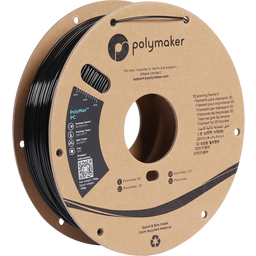
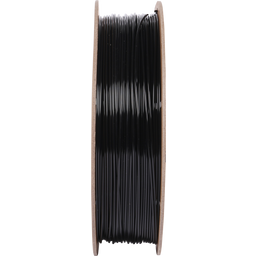
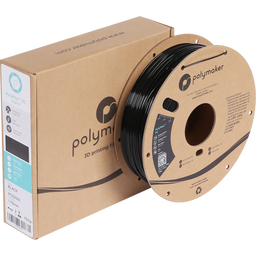

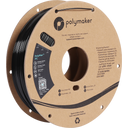
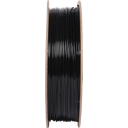
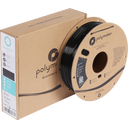
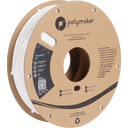

Surprisingly easy to print
Rated with 5 out of 5 stars.
I dreaded PC for a long time and now. It sticks really well on magigoo for PC on garolite bed and wrapping is minimal. My print setting are 255 hot end, 85 bed and 100.5% Horizontal scaling factor. It comes out of the printer a bit short and fat, but after annealing dimensional accuracy is really good.
The only downside is, it doesn't like part cooling fan, but without it overhangs and bridges look terrible, but with cooling layer adhesion suffers greatly. Best remedy I've found is to avoid short layer times, and best way to do it is to print more at the same time.
Lastly, unlike on picture it came on cardboard spool, which is great! Environmentalism aside, cardboard spools don't bend when you dry them at high temps, whereas with plastics it's a lottery.
Was this rating helpful? (2) (0)